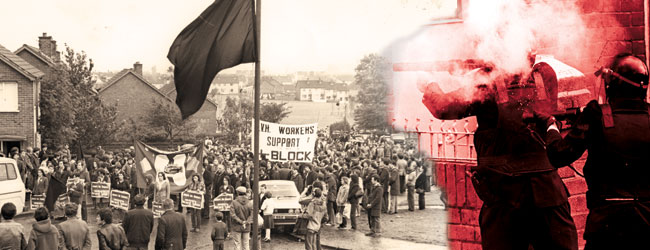4 March 2011
The Night of ‘Auld Lang Syne’

Picket outside Joe McDonnell’s house in Lenadoon, Belfast just hours after his tragic death; During the seven-month-long hunger strike the British army and RUC ruthlessly attacked protestors and mourners, in Belfast alone, 30,000 plastic bullets were fired
1980 had been a tough year. I had spent much of it visiting prisoners in Armagh and the H-Blocks, mostly Mairead Farrell and Bobby Sands, in the build-up to the Hunger Strike. Now, the Hunger Strike was over but instead of taking the opportunity to resolve the crisis (which is what the Catholic Hierarchy and the SDLP, amongst others, claimed would happen if only the prisoners ended the fast), the Brits were arrogantly pressing home a presumed advantage to defeat the resolve of the protesting prisoners. A second hunger strike was inevitable.
It was the last day, the last hours of 1980, and my wife and I decided to see in the New Year with my parents. It was a while before I relaxed. The club was packed, noisy and dense with smoke. Someone requested a particular song and the two musicians nodded to each other and played a cover version of Johnny McEvoy’s 1967 hit, ‘Nora’. It was quite ironic – as things turned out.
At midnight, the musicians played ‘Auld Lang Syne’ and we got up and linked and sang heartily and to my right I discovered that I was linked with Nora – for whom the song, Ir ealised, had been dedicated and for a guilty while I was able to forget that, eight miles away, 300 men were lying in the H-Blocks still on the blanket, and for some a clock was ticking.
Nora was now a married woman with three young children. That night, none of us could imagine what was to unfold.
Just after 5am on Wednesday 8th July, we received news that the fifth hunger striker, Joe McDonnell, had died. I went to the Republican Press Centre on the Falls Road to deal with the media. The eight o’clock news was on the radio when a dull shot rang out. It was nothing unusual and shootings had become fairly routine phenomena around this time. ‘Bingo’ Campbell, who ran messages for us, shouted up the stairs: “They’ve shot somebody in Linden Street!”
I ran out to see what was happening and found a small crowd around a body lying on the ground, encircled by a much larger crowd of both dumbfounded and angry people.
“The fucking cops just opened fire for nothing!” I was told. It was clear from the scene – and later proved by a Canadian camera crew – that there had been no rioting in the area. The victim had been shot in the head and her face was swollen and certainly wasn’t recognisable to me. An ambulance came and I went back to the Sinn Féin office to resume work.
Only later in the day did I learn that it had been Nora. She had got up that morning and found that she was without cigarettes. She left the house for just a minute to go to the corner-shop. RUC Chief Superintendent Jimmy Crutchley had been driving past her corner as the front-seat passenger in a jeep and he ordered another officer to fire. The jeep had to make a deliberately sharp right turn to enable fire. Nora died the following day from a skull fracture and brain injuries inflicted by the plastic bullet. Crutchley was later promoted to Assistant Chief Constable of the RUC.
At the time of Nora’s death, her brother Tommy was on the blanket, his third time in jail – twice interned, now sentenced. Another blanket man at that time, and one familiar to many people throughout Ireland, was Seándo Moore, who died last June and who, had he been alive, would have been on the road this year taking the Hunger Strike Exhibition around Ireland, such was his devotion to his fallen comrades.
Seándo had married Patricia McCabe whose brother Jim was Nora’s husband.
After Nora’s death in 1981 Jim was left to raise seven-year-old Paul, two-year-old Jim and three-month-old Áine. Today, he is still active in Relatives for Justice, campaigning against the use of plastic bullets.
A city so silent and lone, Nora
Where the young and the gay and the best
In polished white mansion of stone, Nora
Have each found a place of rest
Is built where the birds used to play, Nora
And join in the songs that were sung
For we sang just as gay as they, Nora
When you and I were young.
Follow us on Facebook
An Phoblacht on Twitter
Uncomfortable Conversations

An initiative for dialogue
for reconciliation
— — — — — — —
Contributions from key figures in the churches, academia and wider civic society as well as senior republican figures




